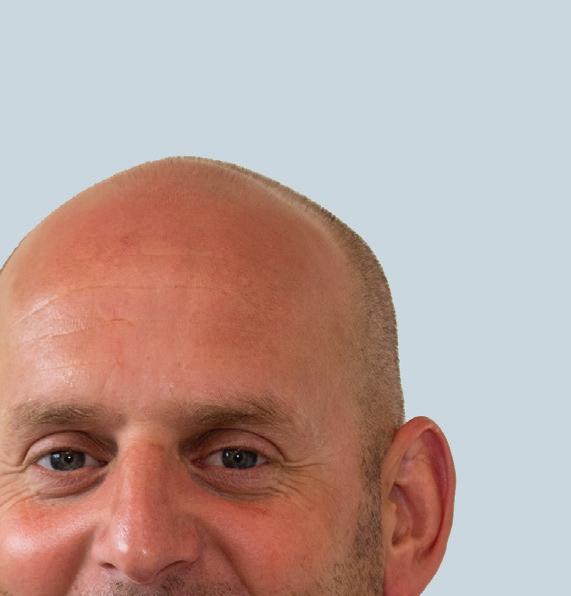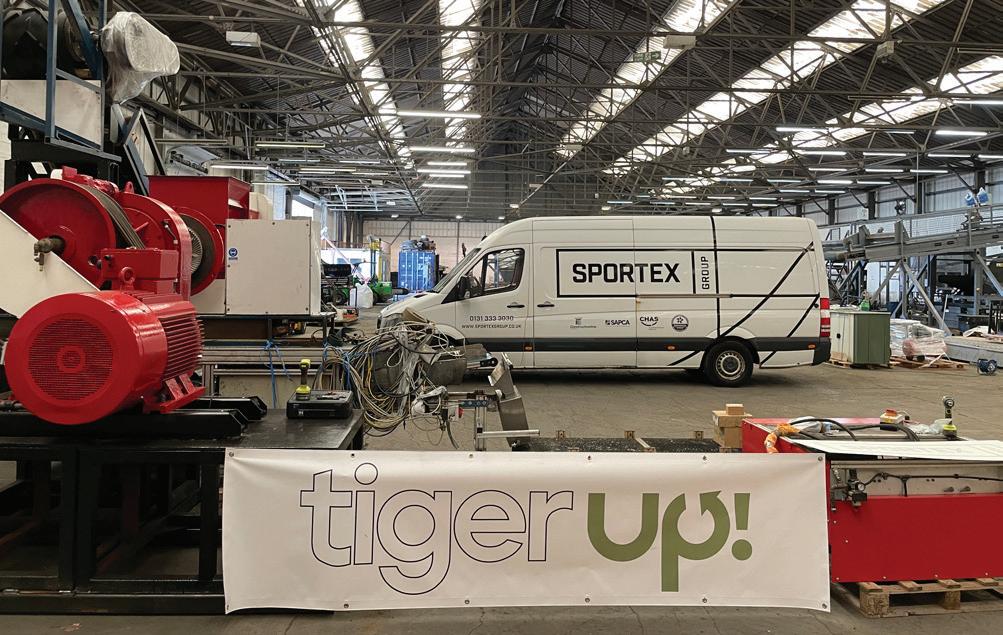
11 minute read
Interview: Jason Douglass


Advertisement
The Sports and Play Construction Association (SAPCA) celebrates its 25th anniversary this year. SportsNation spoke to SAPCA chair Jason Douglass, who was appointed to the role in December appointed to the role in December 2020 and has since set out to oversee the association’s transition oversee the association’s transition to a more business-like organisation to a more business-like organisation


JASON DOUGLASS
It’s SAPCA’s 25th anniversary. How would you describe its journey so far?
SAPCA has had a fantastic 25 years and has established itself as a key voice in the sports and play industry. As an association, we are respected by – and have excellent working relationships with – all the sector’s governing bodies.
We’ve delivered on several initiatives that have improved standards within the industry and have led the charge in the promotion of good working practices and ensuring a degree of quality control in the marketplace. This is perhaps best seen in the SAPCA codes of practice, widely
SAPCA’s main focus is to help build an active nation through the work of its members
recognised as an invaluable resource for those looking to design and build facilities – both at home and abroad. With input from relevant governing and standards bodies, they provide an up to date summary of the current requirements for installation and maintenance across a range of sports surfaces, facilities, and associated equipment.
Having developed a consistent level of quality within our codes, we recognise the opportunity to grow that aspect of our work even further. We want to use our reputation as a major, credible source of information and guidance to expand the resources we offer into new areas of our industry.
We also want to develop a broader range of technical guidance for those looking to undertake facility projects, not just for those constructing or maintaining them. By providing valuable and transparent information to end users, we can help them make better choices – and ensure they invest their money wisely.
What will SAPCA’s direction of travel be as it sets out for the next 25 years?
As we look into the future, we want to build on the very solid platform we’re on and really
SAPCA provides a wide range of guidance for those developing sports facilities


turn up the dial. Our marketplace is facing challenges as we’ve never seen before – from Brexit and climate change to rising energy costs and volatility within the construction materials market. But as well as challenges, they present opportunities: to further improve industry standards and to refine and enhance the way we and our members do business.
Take environmental sustainability, for example, which is at the heart of our future plans. As customer demand for environmentally sustainable solutions grows in our marketplace, our members will be more driven to offer them.
When I took up the role of SAPCA chair in late 2020, I was keen that we breathe more life into what we do as an association - to build on the great work we’ve done, but also ensure we’re not resting on our laurels. One of the decisions we took, as a result, was to adjust the way the board was composed.
If you look at the SAPCA board, there are a lot of individuals around that table who are successful in business and hold senior leadership positions in their respective companies. It, therefore, made a lot of sense to shift the focus, moving away from having a board that operated like a

© SPORT ENGLAND
SAPCA works in close partnership with national governing bodies of sport
We want to build on the very solid platform we’re on and really turn up the dial
governing body and, instead, becoming more business-like in its operations.
The vast majority of our members are commercial operators and businesses – and I believe their trade association should reflect that way of working. A shift towards a more business-like SAPCA is now one of the main directions of travel for us.
What this means in practice is that we will have clear strategic objectives, measurable performance targets and meaningful deadlines for our activities and projects. It also means that our initiatives will be directed at supporting and growing our members’ businesses. We want to engage in delivering credible projects - from which members will see positive and beneficial outcomes.
An example of those specific targets is our Codes of Practice. By producing a roadmap and clear timeline for the publication of new and updated codes, our membership will know which codes are being published, and when, which will help them in their respective industries.
Furthermore, we want to ensure SAPCA members are recognised for their standards of service and workmanship by creating a
© SPORT ENGLAND






Industry challenges
Of the challenges facing the industry Douglass mentions, he picks out three which have significant cost implications on sports and play projects – the increases in the cost of fuel and energy, the ongoing volatility within the supply of construction materials and the Bank of England’s forecasting of a recession and of double digit inflation.
“Construction projects of all kinds – not just those within the sports and play sector – have been affected by constant changes in the availability and cost of a range of products and materials essential to building projects,” he says.
“Add to that inflation and the huge increase in the cost of fuel and energy and what you have is a perfect storm that is pushing prices of projects up.
“This volatility, added to challenging labour supply conditions, and the consequent impact on the timeframes and delivery costs of many projects, is likely to be something we must live with for a while to come. It’s also worth pointing out that contractors may be exposed to added commercial pressures, as some of their existing contracts may not account for the current material price and delivery volatility.
“These issues are not limited to our specific sports and play construction sector. These are problems of a global and national scale.
“Those developing sports and play facilities may find it helpful to take this situation into consideration when planning and managing their projects for the coming year. For example, contractors and suppliers may need to review the periods of time that they are able to hold prices when giving quotations, and the timescales for project delivery may also be affected.”





The SAPCA Environmental Sustainability Working Group launched in 2021 and is dedicated to helping create sustainable and inclusive sports facilities
We have an opportunity to help our members become leading lights in sustainability


quality programme that is recognised for driving up standards in the industry, led by members. My goal is to see tangible value being found as a SAPCA member, whether as a minimum pre-qualification criterion for project opportunities or through helpful and relevant technical support, regional showcase events or networking opportunities within the SAPCA Community.

You mentioned sustainability being at the heart of what SAPCA does?
Yes. Last year we set up the SAPCA Environmental Sustainability Working Group, which places sustainability as one of the main priorities for our ongoing work. Among the group’s main tasks is to help provide enhanced guidance on the various environmental sustainability issues impacting our industry.
The working group comprises three individual focus groups around three key areas where enhanced guidance is required: maintenance, recycling and betterment through design. The group is now developing guidance on all these fronts, some of which will be published later this year.
We are also embarking on an initiative to support members to develop and help improve their environmental sustainability practices. We have to be honest: some of our members probably have outdated environmental policies and sustainability practices within their businesses, so we will be providing support for them to be able to progress and improve their systems and approaches.
We will start that process by working on their behalf and building links and relationships with relevant and respected accreditation services. The aim is to provide our members with a supportive signposting service - through which they can access pre-
Through their work, SAPCA members are helping to raise the standard of the UK’s sports facility stock

The SAPCA membership covers a wide range of businesses

selected accreditation services and get the support they need. That work is now underway and we’re working with accreditation services to secure group discounts and to put on workshops to help our members with their sustainability “journey”. This is particularly important for our smaller member companies, who might need help with resources.
Ultimately, we want all SAPCA members to develop their own environmental policies that are recognised and accredited, to help them align their operating procedures with the latest standards. This will not only benefit the environment but members’ businesses too – as well as SAPCA as a whole.
The construction industry in the UK is moving forward on sustainability matters, so SAPCA must help its members have an opportunity to be leading lights in this space.

One of the big changes for SAPCA in 2022 is the appointment of a new CEO?
Yes, Chris Trickey is retiring from SAPCA and will be replaced by Richard Shaw. Chris has been an incredibly loyal servant to the association and has steered SAPCA ever since its inception in 1997. You can’t overstate the role Chris has had in getting SAPCA into the strong position it’s in today.
Richard steps into the role on 1 June and comes to us from outside our sector, which I think will be a great thing. When we began looking for Chris’ replacement, we had some very strong candidates from a variety of professional backgrounds – which is a testament to the high regard in which SAPCA is held.
Richard has an impressive track record and is familiar with lobbying on behalf of organisations at the highest levels – both the national government and local authorities. He is an individual who is highly experienced in business and strategy and is also a leader who is familiar with – and capable of – delivering change within organisations. His skill set is, I feel, exactly what SAPCA needs at this time and the fact that he’s coming from outside the industry excites me. These really are exciting times for SAPCA in many ways! To read an interview with the incoming SAPCA CEO, Richard Shaw, see p.20 ●
Sportex Group and tiger up! (a subsidiary of TigerTurf UK Ltd) are delighted to announce a new working co-operative agreement to facilitate the UK’s first closed loop recycling facility for end-of-life synthetic turf facilities. This exciting development combines the unique technology of both companies to bring together a fully traceable and compliant recycling solution to ensure that all components from a synthetic turf pitch can be separated, thoroughly cleaned and most importantly processed into a condition to be re-used within the sports facility construction industry.
Using Sportex’s existing recycling technology, reclaimed sand and SRB rubber – that meets the existing standards of the

The partnership will utilise the expertise of the two companies
industry – will be available for re-use within sports facility projects. tiger up! current plastic agglomeration technology has been moved to Sportex’s existing recycling factory in Grangemouth, Scotland where a constant feedstock of un-filled end-of-life artificial turf will be processed and facilitate the production of tiger up!’s innovative and sustainable products for sale back into our industry, including trekboards, which are gaining enormous traction across the UK as a sustainable alternative to timber kickboards.
Conversations are already taking place with industry partners who share our vision and ethos for sustainable change in the UK sports facility industry, but crucially also see tremendous benefit in collaborating together to promote sustainable practises and behaviours through action, not words. We believe this to be a watershed moment in the UK for end-oflife recycling (EOLR) for synthetic turf.
David Hook, Sales Director at TigerTurf says “We’re delighted to announce our collaboration with Sportex Group, a longstanding partner of TigerTurf. When we launched tiger up! in 2021 our goal was to create easily accessible sustainable alternatives for the sports industry and beyond, as well as providing a solution to the mounting issue of recycling endof-life artificial grass. Our collaboration with Sportex helps us do that. We are ecstatic to be leading our industry into a new era of sustainability and recycling.




More information visit: www.tigerup.co.uk










